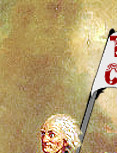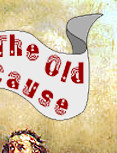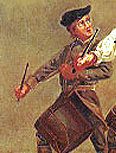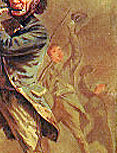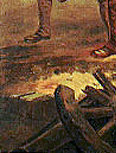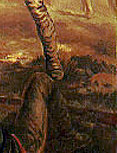Louis
Bromfield was a sort of Northern agrarian, a Jeffersonian
democrat of the Old Northwest. He was soft on FDR's
Civilian Conservation Corps and some aspects of the
Tennessee Valley Authority, but was otherwise critical
of New Deal methods, as can be seen in his essays
on farming in Pleasant
Valley (1943[reprint 1971]). Bromfield was
a screenwriter (writer of the 1940 Fox production,
"Brigham Young, Frontiersman," among others),
novelist of the agrarian way of life, and a practicing
farmer.
He
was very fond of France, where had lived and farmed,
and admired the French peasant's sense of limits.
As he later wrote: "I had found there a continuity
which had always been oddly lacking in American life
save in remote corners… like parts of the New England
and the South… where permanence and continuity of
life existed through inertia and defeat…. The permanence
and continuity of France was not born of weariness
and economic defeat, but was a living thing, anchored
to the soil, to the very earth itself."1
Bromfield was not very fond of Germany. That he supported
US entry into World War II is not very surprising.
Bromfield's
showcase farm – and the subject of his book, Malabar
Farm (1948) – is now run by the state
of Ohio as a museum and center for spreading ideas
on "sustainable farming." There is a website,
www.malabarfarm.org.
His literary production includes twenty some novels,
essays on farming, and an airing of his political
views, A Few Brass Tacks (1946). Public television
has treated Bromfield's life and ideas in a film,
The
Man Who Had Everything (1999).
Bromfield
was something of a moralist. He had a lot to say about
waste, soil erosion, economic instability, installment
buying, proletarianization, and other aspects of modern
life which were opposed to the agrarian way of life.
Things were so far gone that "each depression
will be followed by more and more destructive taxations,
as the whole economic structure of the nation grows
weaker and sinks to a European and finally an Asiatic
standard of living." Yet he was skeptical of
state intervention – fascist or socialist – to address
such problems. Speaking of soil conservation, he wrote
that its intelligent advocates knew that "no
remedial measures would be effective if imposed
by government" (his emphasis).2
There
was much truth in the agrarian critique of modern
life, but not much economic theory. It is unfortunate
that Bromfield seems never to have confronted the
thought of Wilhelm Rüpke, a German free-market economist
with a strong interest in agrarian issues. Rüpke might
have shown Bromfield how free markets, properly understood,
could address many of his Jeffersonian concerns.
COLD
WAR CRITIC
But
of course I don't do much with farming in this space.
It is Louis Bromfield's later reflections on foreign
policy which will concern us. When World War II gave
way to mobilization-in-permanence – the Cold
War – Bromfield emerged as an outspoken critic.
The most complete expression of his views is his book,
A
New Pattern for a Tired World (1954). This
is not the easiest book to find. I found my copy in
London, and a friend found one in LaBelle, Florida.
There are two editions – New York and London – and
the page numbers differ from one to the other. (I
cite the London edition here.)
As
a Jeffersonian agrarian, Bromfield believed free trade
to be essential to the development of agriculture
across the globe. Sound agriculture was the key to
further economic progress everywhere. Bromfield's
case against US domestic and foreign economic policies
nicely recapitulated the controversy between Jefferson
and Hamilton, as well as the one between Bukharin
and Trotsky/Stalin/Preobrazhensky during the so-called
Soviet industrialization debate of the 1920s.
US
foreign policy was becoming the great obstacle to
spontaneous development. Bromfield posited a sharp
conceptual conflict between cartelized European capitalism
and the ideal American model resting on free markets.
European imperialism had established a top-down system
of politicized capitalism throughout the colonial
world. It was no wonder that people in the colonies
were now rejecting both European rule and – mistakenly
– capitalism, which they identified with that rule.
Under
the slogan of anti-communism, US foreign policy-makers
aspired to suppress anticolonial, nationalist revolutions
everywhere. This put America on a collision course
with these inevitable revolts and put us on the wrong
side of history (as the phrase goes). It was a hopeless
and futile course, which could prove to be very costly.
THE
PATTERN OF MILITARISM AND SECRET GOVERNMENT
Growing
governmental secrecy, "Big Lie" propaganda, and fear-mongering
thrived under Cold War foreign policy. A "Messiah
complex, peculiarly an Anglo-Saxon disease which at
times can border on the ecstatic and the psychopathic"
helped fuel these trends.3 It was
a mistake to believe we could export our way of life
overseas. The smug attempt to do so simply stirred
up resentment abroad.
Centrist
and Establishment writers sometimes treat complaints
about the "military-industrial-university complex"
as a sort of intellectual disorder which sprung from
the fevered brain of C. Wright Mills and then went
on haunting overwrought people who read the Report
from Iron Mountain too often. That the painfully
middle-of-the-road president, Eisenhower, the Jeffersonian
Bromfield, and Old Right figures like Felix Morley
and John T. Flynn also noted the phenomenon suggests
to me that it was not the idle fancy of "anti-American"
leftists.
OPEN
DOORS AND FALLING DOMINOES
Bromfield
anticipated New Left historian William
Appleman Williams' notion of an Open Door for
revolutions. It would be better in the long run, he
reasoned, to allow them to run their course with as
little war as possible. The present American "attempt
to dominate and direct the whole course, not only
of Asia, but of the world, is a policy of insanity
which can only cause war after war and the eventual
ruin of this nation." If Asians chose "the disastrous
experiment of Communism" in throwing off foreign colonialism,
that was "Asia's problem and none of our own."4
The
whole geopolitical conceptions behind US policy needed
rethinking: "The arrogant assertion that Korea, lying
in the very midst of the Russo-Chinese-Japanese orbit,
is our frontier is an idiotic assumption which cannot
be maintained save at huge expense or the prospect
of a third World War and economic ruin. If Korea is
our frontier, so then is every nation in the world,
and we are tempted to ask whether our future policy
will be one of maintaining military installations
and conscripted armies in every nation of the world."5
US
intervention in Indo-China, already under way, had
been "merely disastrous" in every way. Applying common
sense to the case, rather than any special gift of
prophecy, Bromfield wrote, "[i]t is an intervention
and a battle which in the long run can never be won
by either France or the US even though we pour more
millions and more lives into the debacle for years
to come."6
FREE
TRADE ACROSS THE BOARD
Bromfield
decried US trade policies aimed at coercing Cold War
enemies: "We have chosen as a policy to strangle
trade with Russian and Red China in an attempt to
bring about a steady deterioration of living standards
and a proportionate increase in discontent within
the borders of both nations." This was counterproductive
and increased tensions. It would be far more productive
to open up trade with these nations. Furthermore,
trade would undermine communism: "A prosperous
Russia, a prosperous China and Japan, a prosperous
Europe are the best guarantors not only of peace but
of the eventual slow destruction of the Marxian theory
(which in practice fails to produce either prosperity,
freedom or food) everywhere in the world, including
Soviet Russia itself."7
This
seems sound, if radical-sounding advice. It was, Bromfield
suggested, precisely the external threat to the "ramshackle"
Soviet empire – a threat gratuitously provided by
the Americans – that helped the Soviet leadership
cling to power. The continuing good health of Saddam
Hussein's government in Iraq makes one wonder if Bromfield
didn't have something there.
It
may be that making foreigners miserable in order to
goad them into overthrowing regimes on Uncle's little
list merely makes people miserable, not to mention
prematurely dead. Perhaps it makes unneeded enemies
for Uncle, as well as for those of us associated with
him in the minds of the foreigners so treated. Indeed,
it may turn out that it is not markets and capitalism
that lead to the "immiseration" of the masses
but, instead, the foreign policies of those who preach
global capitalism, free markets, and democracy while
practicing none of them.
As
a farmer, Bromfield understood the wisdom of Candide's
conclusion that it is better "to cultivate our
own garden," rather than interfere with the world.
Notes

